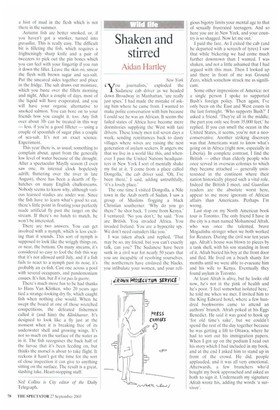Shaken and stirred
Aldan Hartley
New York N7 o u journalists,' exploded the 1 Sudanese cab driver as we headed down Broadway in Manhattan, are really just spies.' I had made the mistake of asking him where he came from. I wanted to make polite conversation with him because I could see he was an African. It seems the failed states of Africa have become mere dormitories supplying the West with taxi drivers. These lonely men toil seven days a week, sending remittances back to dusty villages where wives are raising the next generation of asylum seekers. It angers me that we live in a world like this, and whenever I pass the United Nations headquarters in New York I sort of mentally shake my fist at it. 'I come from a place called Dongolla,' the cab driver said. 'Oh. I've been there,' I said, adding untruthfully, 'it's a lovely place.'
The one time I visited Dongolla, a Nile town in the Arab north of Sudan, I saw a group of Muslims flogging a black Christian southerner. 'Why do you go there?' he shot back. 'I come from Kenya,' I ventured. 'No you don't,' he said. 'You are British. You invaded Africa. You invaded Ireland. You are a hypocrite spy. We don't need outsiders like you.'
I was taken aback and replied, 'That may be so, my friend, but you can't exactly talk, can you? The Sudanese have been sunk in a civil war for nearly 50 years that you are incapable of resolving yourselves, the northerners have enslaved the blacks, you infibulate your women, and your reli gious bigotry limits your mental age to that of sexually frustrated teenagers. And so here you are in New York, and your country is so shagged. Now let me out.'
I paid the fare. As I exited the cab (and he departed with a screech of tyres) I saw that while bickering we had come much further downtown than I wanted. I was shaken, and not a little ashamed that I had argued with this man. Then I looked up and there in front of me was Ground Zero, which somehow struck me as significant.
Some other impressions of America: not a single person I spoke to supported Bush's foreign policy. Then again, I've only been on the East and West coasts in the last fortnight. 'Who supports Bush?' I asked a friend. 'They're all in the middle; the part you only see from 35,000 feet,' he replied. If you can smell the ocean in the United States, it seems, you're not a neoconservative. Another striking discovery was that Americans want to know what's going on in Africa (right now, especially in Liberia). In complete contrast, I find the British — other than elderly people who once served in overseas colonies to which they became attached — generally uninterested in the continent where their nation historically played such a vital role. Indeed the British I meet, and Guardian readers are the absolute worst here, appear to me more ignorant of African affairs than Americans. Perhaps I'm wrong.
Last stop on my North American book tour is Toronto. The only friend I have in the city is a man named Mohamoud Afrah, who was once the talented, brave Mogadishu stringer when we both worked for Reuters. During the civil war ten years ago, Afrah's house was blown to pieces by a tank shell, with his son standing in front of it. Afrah buried his boy at the front door and fled. He lived on a beach shanty for months until we were able to evacuate him and his wife to Kenya. Eventually they found asylum in Toronto.
At least Afrah is alive, but he looks old now, he's not in the pink of health and he's poor. 'I feel somewhat isolated here,' he told me when we met. I invited him to the King Edward hotel, where a few hundred bookworms came to attend an authors' brunch. Afrah poked at his Eggs Benedict. He said it was good to hook up 'for old time's sake', but we couldn't spend the rest of the day together because he was getting a lift to Ottawa, where he had to sort out his immigration papers. When I got up on the podium I read out his story which I had included in my book, and at the end I asked him to stand up in front of the crowd. He did, people applauded, and it was all very emotional. Afterwards, a few brunchers who'd bought my book approached and asked us both to sign it. Underneath my signature Afrah wrote his, adding the words 'a survivor'.


























































































 Previous page
Previous page